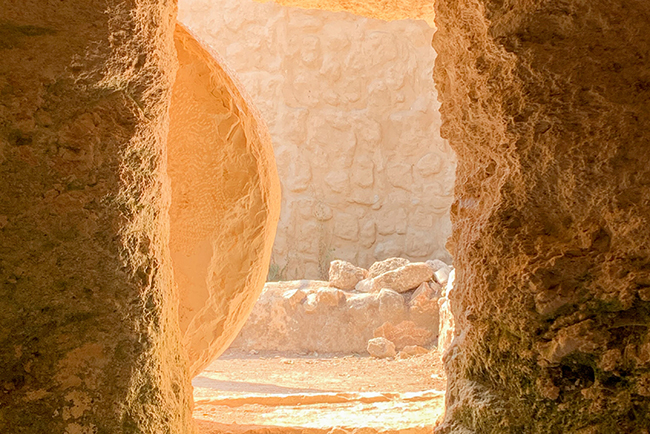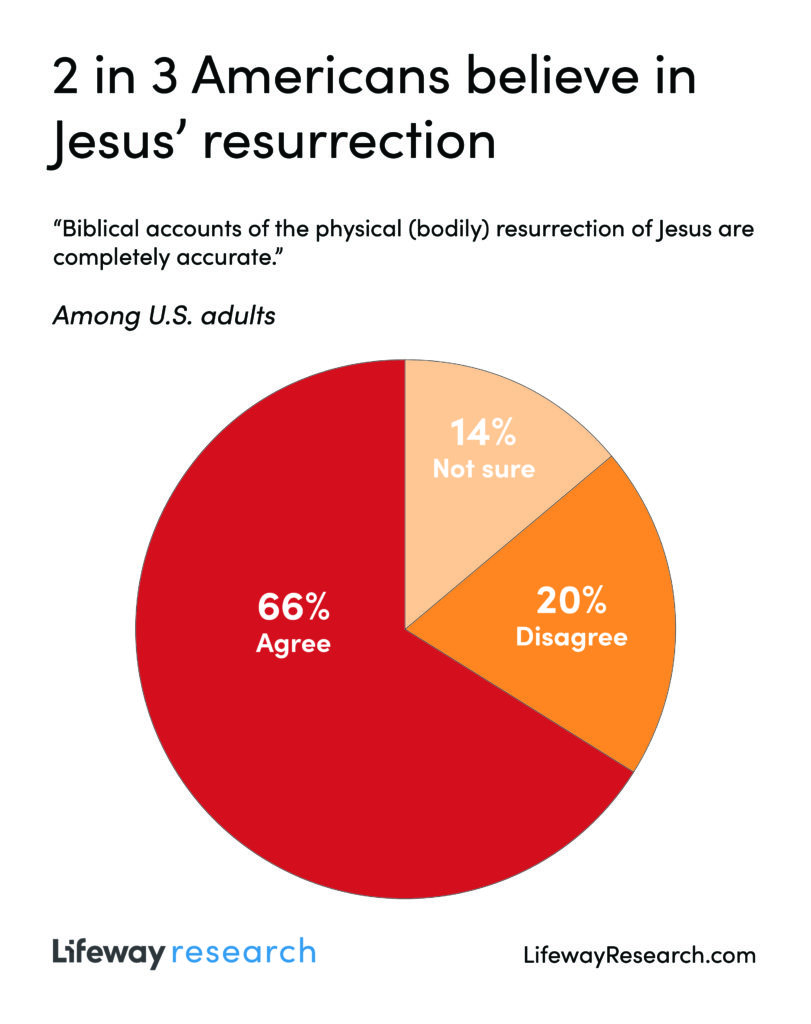
By Aaron Earls
The truthfulness of the resurrection is not as controversial today as many Christians may assume. The bigger issue, however, may be helping Americans recognize the relevance of Jesus rising from the dead.
Two-thirds of American adults (66%) say they believe the biblical accounts of the physical resurrection of Jesus are completely accurate, according to the 2020 State of Theology from Lifeway Research. One in 5 (20%) disagree, and 14% are not sure.
Two-thirds of American adults (66%) say they believe the biblical accounts of the physical resurrection of Jesus are completely accurate. Click To Tweet
Most believe in Jesus’ resurrection
For Christian author and apologist Rebecca McLaughlin this is a good news, bad news situation. “The fact that two-thirds of Americans say they believe that Jesus literally rose from the dead makes me feel two things: hopeful and heartbroken,” she said.
“First, I feel hopeful, because it suggests that twice as many Americans as attend church weekly might be open to doing so if they were invited. This is a huge opportunity,” said the author of Confronting Christianity: 12 Hard Questions for the World’s Largest Religion. “Church attendance isn’t the ultimate goal, of course. But connecting these people who must on some level think they are Christians with regular Bible teaching and real Christian community would be a major step toward them trusting in Christ.”
Adults who attend church services at least once or twice a month are more likely to say they believe in the resurrection (89%). Even among those who don’t attend as frequently if at all, however, almost half (48%) agree Jesus’ bodily resurrection happened just as the Bible describes it.
“But I also feel heartbroken,” McLaughlin said, “because the idea that someone would say they believe Jesus actually rose from the dead but that this belief would have so little impact on their life that they weren’t even part of a church is truly tragic. This exposes the danger of ‘cultural Christianity’—the vague assent to Christian beliefs without any evidence of actual faith in Christ.”
"The idea that someone would say they believe Jesus actually rose from the dead but that this belief would have so little impact on their life that they weren’t even part of a church is truly tragic." — @RebeccMcLaugh Click To TweetThis may change how Christians think about apologetics and evangelism. “Traditionally, one big focus of apologetics has been arguments for the bodily resurrection of Jesus,” she said. “But the 66% of Americans who say they believe this don’t need those arguments. Instead, they need to understand what difference it makes that Jesus rose from the dead. We need to show them that it makes all the difference in the world, and that if Jesus is risen, He is also Lord.”
Some aren’t sure about Jesus’ resurrection
McLaughlin said we may find those doubting (14% of Americans) both outside the church walls and sitting in the pews on Sunday. “Those who say they’re not sure if Jesus rose from the dead may be non-churchgoers who feel on the fence, or they may be churchgoers who have not been taught the vital importance of the resurrection to everything else a Christian believes. This final group needs to see that the stakes are high,” she said. “As the apostle Paul put it, if Christ has not been raised, our faith is useless (1 Corinthians 15:14).
Some don’t believe in Jesus’ resurrection
Despite the seemingly low numbers of Americans who outright reject the resurrection, that doesn’t mean apologetics arguments are no longer needed, according to McLaughlin. “The 20% of Americans who say they don’t believe in the resurrection still need to hear why it might just be true,” she said.
“But they also need to hear what difference it would make. And they need to see it in our lives. If we’re not living as if Jesus is truly Lord, which means both proclaiming the gospel and caring for the poor and oppressed, our unbelieving friends won’t have any motivation to wish the resurrection was true—which is often the first step to believe that it is.”
"If we’re not living as if Jesus is truly Lord, our unbelieving friends won’t have any motivation to wish the resurrection was true—which is often the first step to believe that it is." — @RebeccMcLaugh Click To TweetOne group that is more likely to deny the resurrection is the next generation. A majority of 18- to 34-year-olds (59%) say they don’t believe the biblical accounts of Jesus bodily resurrection. “Young adults are less likely to be cultural Christians than their parents or grandparents, partly because identifying as a Christian isn’t seen as positively by folks outside the church as it once was,” said McLaughlin, author of 10 Questions Every Teen Should Ask (and Answer) About Christianity.
Because Christianity no longer has the cultural cache it had in previous generations, McLaughlin said Christians today need to be concerned with living out their faith, including on issues of racial injustice where the church has undermined its moral credibility. “It is important for this generation to understand that the Jesus in whose resurrection we believe is a brown-skinned, Middle Eastern Jew who broke through every racial and cultural barrier of His day,” she said, “and that the global church today represents the most diverse and widespread belief system in the world.”
“It is important for this generation to understand that the Jesus in whose resurrection we believe is a brown-skinned, Middle Eastern Jew who broke through every racial and cultural barrier of His day." — @RebeccMcLaugh Click To TweetMcLaughlin issued a warning for modern Christians wanting to convince the next generation of the resurrection apart from living out biblical ethics. “If we don’t go back to the Bible itself on ethical questions, and if we’re not ready to repent when we find our tribe has sinned when it comes to racial injustice, this generation is unlikely to be interested in what we have to say about the central, historical truth-claim of the Christian faith: that Jesus literally rose from the dead,” McLaughlin said.









